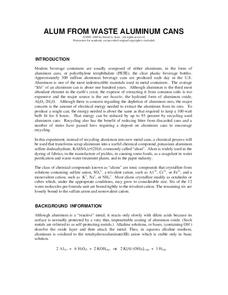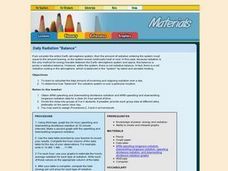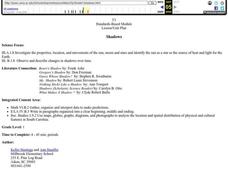Pearson
WH-Questions
Why can't you answer a wh- question with yes or no? Learn about the ways you can use the five W's to form questions that will give you the most information in an answer.
Folger Shakespeare Library
Essential Everyday Bravery
Shakespeare's plays may be old, but they still have relevant lessons for today's world! A collection of lesson plans uses examples from The Merchant of Venice and District Merchants to teach about bravery. In addition to learning...
Curated OER
Exploring Seasonal Shadows and Sunlight
What can shadows tell us about the changing season? Over several months, astronomy learners record length and position of an outdoor object's shadow, such as a flagpole. They apply the data to a growing hypothesis and note the...
Peace Corps
Introducing Culture
Growing up within a culture leaves a lot of ideas and values unspoken. Take a closer look at the cultures in which your learners live with a discussion activity that addresses cultural identity and traits of those living within the...
Chymist
Alum from Waste Aluminum Cans
Turn aluminum cans into pickles! An engaging experiment has learners chemically change aluminum into a substance with many purposes including the manufacture of pickles. After performing the chemical conversion, the experimenters verify...
National Wildlife Federation
An Energy Mix: Renewable and Nonrenewable Resources
What did the windmill say about renewable energy? I'm a BIG fan! Lesson three in the series of 12 has classes discuss potential and kinetic energy and then, in pairs, they complete a web quest over the different types of energy...
It's About Time
Succession in Communities
What occurs following a natural disaster? High schoolers research this question and others as they investigate natural succession after a disaster. First, as they differentiate between primary and secondary succession, they explain...
Curated OER
Contrasting Cinderellas
Learners compare and contrast the traditional Cinderella to the modern-day fairy tale, Cinder Edna. In this fairy tales instructional activity, students read both stories and construct a Venn diagram to compare the two fairy tales....
Curated OER
Renewable Energy
Students examine the United States' current and future energy needs. They describe different forms of renewable energy sources and compare the impacts of renewable and non-renewable energy sources on the earth and society.
Curated OER
Fossil Fuels vs. Alternative Fueling Systems
Fourth graders brainstorm the differences between the fossil fuels that people use in their transportation now and what they could use to minimize greenhouse gas emissions. They use a variety of techniques from webquests to writing...
Curated OER
Should We Allow New Mining in the Upper Peninsula?
Students compose an essay taking a position on whether or not a proposed
mine near Marquette, MI should be opened. Students defend their position addressing relevant issues through factual supporting details. Their essay includes an...
Curated OER
Earth Processes
Fourth graders explore and discuss the process of evaporation. They discuss how wet things become dry. Students observe the process of evaporation and they make predictions about the observations they make about evaporation. Students...
Curated OER
Daily Radiation "Balance"
Students explore the amount of radiation in the Earth's atmosphere. They calculate the total amount of incoming and outgoing radiation over a day and determine how "balanced" the radiative system is over a particular location.
Curated OER
Our Solar System
Students study the Earth and Solar System through a variety of activities. They compile a coloring book show the characteristics of the Sun and nine planets.
Curated OER
Charting Seasonal Changes
Learners research the Earth's patterns of rotation and revolution, create a chart and graph of these patterns and use them to explain the causes of night and day and summer and winter.
Curated OER
Flying Through the Solar System
Learners create a model of the solar system out of candy. They write a book about their travels through the Solar System, beginning at age ten and reaching Pluto at age seventy.
Curated OER
Continents and Oceans on the Move
Young scholars create an awareness of the vast percentage of water covering the earth. They relate similarities/differences between topographical maps and other maps of various time periods. Students examine how to use a topographical map.
Curated OER
Solar System Slide Show
Students work in small groups to research a planet in our Solar System in order to compare it to Earth. They examine the planet's size, atmosphere, rotation and revolution periods, temperature, and other attributes. They collect...
Curated OER
Shadows
First graders measure how a shadow changes over the course of a day. They write about what they would do if they lost their shadow, and make silhouettes of themselves. Students make up a shadow dance and read stories about shadows.
Curated OER
Weather Predictions
Students record weather data and create a five day forecast. Students investigate the roles of meteorologists and identify symbols used on a weather map. After gathering weather data for a week, students will create a five day forecast...
Curated OER
Movement of Air II
In this movement of air worksheet, students determine the deflection of air masses that result from Earth's eastward rotation. Then they describe what winds provide for different trades. Students also identify and describe the imaginary...
Curated OER
Message in a Bottle
Sixth graders write a short story about being stranded on a deserted island. After a brief geography review of locations at various latitudes and longitudes, 6th graders draft their story about being stranded. They use sensory and...
Curated OER
Upwelling Terrestrial Radiation
Students calculate the hourly irradiance of the earth at a site given the near-surface air temperature of the site. They compare the calculated values of irradiance with those measured by instruments at the site. Students need to...
Curated OER
Solar Box Cooker
Students explore solar power. In this solar power instructional activity, students build simple solar cookers after they study convection, conduction, and radiation. Students transfer their knowledge of how the solar cooker works to...
Other popular searches
- Earth Day Writing Activities
- Earth Day Writing Prompts
- Earth Day Writing Paper
- Earth Day Writing Lesson
- Earth Day Writing Worksheets























